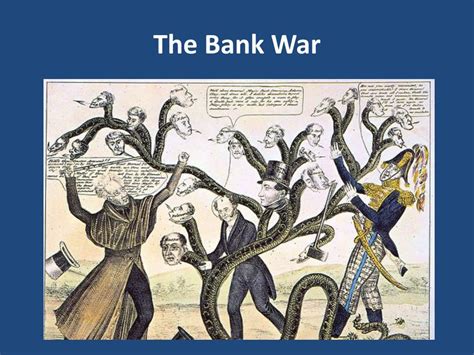Introduction
The Bank War, a pivotal event in American history, marked a fierce political struggle between President Andrew Jackson and the Second Bank of the United States (BUS). This conflict ignited intense debates over the role of the federal government in the economy and the power of central banking.

Historical Background
In the early 19th century, the United States experienced rapid economic expansion and the rise of new banking institutions. The BUS, chartered in 1816, became the primary financial institution of the federal government, holding government deposits and issuing currency. However, its policies and practices drew criticism from various segments of society.
Jackson’s Opposition to the BUS
President Andrew Jackson emerged as a vocal opponent of the BUS, viewing it as a monopoly that favored wealthy elites and threatened the power of the states. He believed that central banking gave too much control to private interests and undermined the ability of the government to regulate the economy.
The Bank’s Recharter Debate
In 1832, the BUS sought to renew its charter, which was due to expire in 1836. Jackson vetoed the recharter bill, igniting a fierce political battle that would shape American history. He argued that the BUS was unconstitutional and detrimental to the economic interests of the nation.
Removal of Federal Deposits
In 1833, Jackson ordered the removal of federal deposits from the BUS to state banks. This move crippled the BUS and forced it to liquidate its assets. The resulting “Bank Panic” of 1834 plunged the nation into an economic depression.
Aftermath of the Bank War
The Bank War had profound consequences for American politics and the economy. It weakened the power of the federal government over banking and led to a decentralized financial system. Jackson’s victory rallied the support of the small farmers, laborers, and urban workers who had supported his presidency.
Key Figures and Quotes
Andrew Jackson
“The Bank is trying to kill me, but I will kill it.”
Henry Clay
“The President has killed the Bank, but who will kill the President?”
Daniel Webster
“The Bank is part of the constitution of the country.”
Impacts of the Bank War
Economic Impact
- Weakened the role of the federal government in banking
- Led to a decentralized financial system
- Triggered the “Bank Panic” of 1834, causing an economic depression
Political Impact
- Reinforced Jackson’s popularity and power
- Divided the Democratic Party between supporters and opponents of the Bank
- Strengthened the role of state banks in the economy
Legacy and Historical Significance
The Bank War remains a significant event in American history. It demonstrated the tension between federal power and states’ rights. It also highlighted the need for a stable and effective financial system and the importance of regulating financial institutions.
Tips and Tricks for Understanding the Bank War
- Familiarize yourself with the key figures and events involved.
- Analyze the motivations of both Jackson and the BUS.
- Consider the economic and political impacts of the conflict.
- Understand the long-term legacy of the Bank War.
